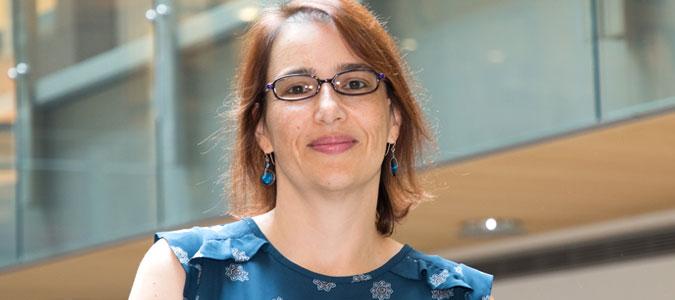
Credit: Mary Zhu
Many proteins are required to maintain the structure, and to preserve the genetic integrity, of DNA. Sliding clamps are proteins that increase the efficiency of DNA replication. Without these proteins, cells would not be able to carry out continuous DNA synthesis, and organisms, from bacteria to humans, would not survive.
Sliding clamps are ring-shaped proteins that encircle DNA and bind to the DNA polymerase, the enzyme that performs the actual DNA replication. They effectively organize and orient the DNA and its ancillary proteins so as to enable replication. Sliding clamps are oligomeric proteins; they are made up of more than one identical copy of individual proteins called monomers.
The bacterial E. coli clamp, called beta, is made up of two identical monomers. Human cells contain clamps called PCNA, which are made up of three identical monomers. Strong intermolecular forces between these identical monomers ensure that the rings are stable in solution and do not fall off the DNA during replication.
The self-assembly of the monomers of sliding clamps into a stable doughnut-shape ring is controlled by ionic and other intermolecular forces. It is known that assembly of these structures can be influenced by the presence of salts, but other forms of molecular control over this self-assembly are not well understood. In an effort to understand the molecular basis for clamp self-assembly, associate Professor Marcia Levitus from School of Molecular Sciences and co-workers have now found that these protein doughnuts assemble in previously-unknown ways when exposed to molecules that bacteria typically use to tolerate high levels of salt in the environment.
Specifically, potassium glutamate (KGlu) and glycine betaine are found to promote self-assembly of beta and PCNA clamps into structures containing many doughnuts stacked face-to-face. These structures resemble tubes of doughnuts, and are only observed in the presence of compounds that cells produce when they need to tolerate high salt concentrations in the growing medium.
Their research, which has just been published in the Biophysical Journal, is a result of a long-standing collaboration with Professor Linda Bloom who works in the department of biochemistry and molecular biology, University of Florida.
“In this study we examine non-Coulombic effects on the self-assembly properties of sliding clamps,” explained Levitus. “We determined relative diffusion coefficients of two sliding clamps using fluorescence correlation spectroscopy. Although so far we worked with two sliding clamps, our results suggest that our findings are not specific to these proteins and may be generalizable to a wide range of protein-protein interactions.” Levitus is also part of the Biodesign Center for Single Molecule Biophysics.
Cells accumulate glutamate and related molecules under stress, and so formation of high-order protein assemblies under these conditions has important biological implications. Specifically, this would represent a mechanism by which the presence of stressor compounds in the cell could control DNA replication.
###
Ian Gould contributed to this story
Media Contact
Jenny Green
[email protected]
Original Source
https:/
Related Journal Article
http://dx.




